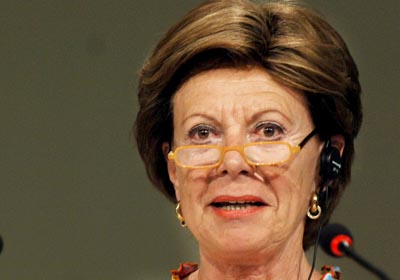
AUSTRIA’S OMV UTILIZING AND SABOTAGING THE EU AT THE SAME TIME
Publication: Eurasia Daily Monitor Volume: 5 Issue: 22
By:

Austria’s state-dominated OMV energy company is pursuing a two-track policy in relation to the European Union. On one track, OMV seeks the support of EU institutions and legal mechanisms to force a takeover of Hungary’s private-owned MOL energy company, which has consistently bested OMV in the regional market competition. On the other track, OMV is teaming up with Russia’s Gazprom to turn the EU’s high-priority Nabucco gas transport project into a joint venture with Gazprom. Farther along this second track lurks a possible tie-up of OMV itself with Gazprom, in which case energy assets in a number of Central European countries, including Hungary, would fall under Russian control. The Austrian government supports both tracks of OMV’s policy in relation to the EU and Gazprom.
On the EU institutional and legal track, OMV on February 1 notified the European Commission’s Directorate-General for Competition (headed by Competition Commissioner Neelie Kroes) about OMV’s intention to take over MOL. The request triggers a merger-control procedure whereby the EU can approve the takeover while requiring the newly merged entity to sell off some assets, in compliance with EU competition law, so as to prevent a regional monopoly from arising. The merger-control procedure moves fast in two phases for a maximum 35 working days and a maximum 105 working days, respectively.
MOL has responded in a statement that it expects the EU’s inquiry to unveil precisely the anti-competition implications of OMV’s takeover bid, which could lead to monopolization of oil refining and product marketing in several Central European countries, lower industry efficiency, and higher prices to consumers.
OMV’s approach to EU competition authorities is the second move by the Austrian company and government to enlist EU support for their hostile takeover bid. In the first move, in November 2007, they successfully lobbied the EU’s Directorate-General for the Internal Market (under Commissioner Charlie McCreevy) to trigger EU legal proceedings against Hungary. At stake is Hungary’s law that defends privately owned energy supply companies of vital importance to the public from hostile takeovers by foreign state-controlled entities. The EU procedure in this case involves three phases and is considerably longer than the competition inquiry (see EDM, November 20, 2007).
Both of OMV’s moves look weak legally, but rely on in part on superior Austrian political influence in Brussels. They seem to spell protracted and debilitating litigation. They appear designed in part to influence the stock market and predispose some MOL shareholders toward a possible takeover.
On the parallel track, OMV is undercutting the EU’s Nabucco project in two basic ways. First, it has just turned Nabucco’s designated terminal and storage center at Baumgarten into a 50%-50% OMV-Gazprom joint venture. The Austrian government and OMV had announced this intention in May 2007, but the EU (or the United States, which equally backs Nabucco) did nothing to discourage the signing of this handover (see EDM, January 29).
Furthermore, OMV is now hinting at turning the planned Nabucco pipeline itself, not just the terminal and storage center, into a joint project with Gazprom. Thus, Austrian Economics Minister Martin Bartenstein and OMV executive Reinhard Mitschek, who is the Nabucco project’s general director, have suggested in recent days that the Nabucco pipeline should also carry Gazprom gas and that Nabucco can be “integrated” with Gazprom’s South Stream project. Furthermore, Mitschek claims that security of supply — the EU’s goal — can be achieved not only through diversifying the sources, but also through diversifying the delivery routes originating from the same source, which is Russia (including Russian-delivered Central Asian gas, which Russia prevents Nabucco from accessing). OMV’s CEO Wolfgang Ruttenstorfer even claims credit for ensuring that the project would also carry Nabucco gas, not only Gazprom’s gas, following the signing of the OMV-Gazprom agreement (Financial Times, February 2). All this would defeat the EU’s strategic rationale for the Nabucco project.
Ever since OMV embarked on its takeover bid against MOL in June 2007, energy analysts in Central Europe have noted circumstantial evidence that Gazprom was no stranger to this move. Such indications continue to surface. Asked about this by the press at the signing of the agreement on Baumgarten, Gazprom vice president Alexander Medvedev replied that there were “no detailed talks” in progress (Interfax, January 25). And an OMV-promoting ad, seeking to shore up the value of the company’s shares, offers inter alia the following argument: “[OMV’s] good relations with Gazprom could also pay off in the project that has occupied the Austrian company in recent months: the planned takeover of Hungary’s MOL concern. Gazprom has shown an interest here also. Thus, Gazprom and OMV can divide MOL among themselves. Stock-exchange rumors even speak of Gazprom acquiring a stake in OMV” (WirtschaftsWoche, January 14-21).
OMV and MOL own, each, major oil refineries and fuel-distribution networks in Romania, Slovakia, and Croatia, in addition to their respective assets in Austria and Hungary. A takeover of MOL by OMV can only succeed if abetted by EU authorities. Such a merged entity would be required by the same EU authorities to sell off some of those assets. In that case, Gazprom and the GazpromNeft-Lukoil joint venture would be the only buyers in sight.
(Austrian Press Agency Economic News Service, Hungary Business Wire, MTI, Dow Jones, February 1-4)




